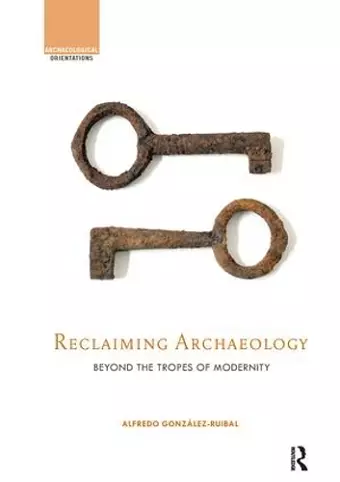Reclaiming Archaeology
Beyond the Tropes of Modernity
Alfredo González-Ruibal editor
Format:Paperback
Publisher:Taylor & Francis Ltd
Published:11th Nov '16
Currently unavailable, our supplier has not provided us a restock date
This paperback is available in another edition too:
- Hardback£250.00(9780415673921)

Archaeology has been an important source of metaphors for some of the key intellectuals of the 20th century: Sigmund Freud, Walter Benjamin, Alois Riegl and Michel Foucault, amongst many others. However, this power has also turned against archaeology, because the discipline has been dealt with perfunctorily as a mere provider of metaphors that other intellectuals have exploited. Scholars from different fields continue to explore areas in which archaeologists have been working for over two centuries, with little or no reference to the discipline. It seems that excavation, stratigraphy or ruins only become important at a trans-disciplinary level when people from outside archaeology pay attention to them and somehow dematerialize them. Meanwhile, archaeologists have been usually more interested in borrowing theories from other fields, rather than in developing the theoretical potential of the same concepts that other thinkers find so useful.
The time is ripe for archaeologists to address a wider audience and engage in theoretical debates from a position of equality, not of subalternity. Reclaiming Archaeology explores how archaeology can be useful to rethink modernity’s big issues, and more specifically late modernity (broadly understood as the 20th and 21st centuries). The book contains a series of original essays, not necessarily following the conventional academic rules of archaeological writing or thinking, allowing rhetoric to have its place in disclosing the archaeological. In each of the four sections that constitute this book (method, time, heritage and materiality), the contributors deal with different archaeological tropes, such as excavation, surface/depth, genealogy, ruins, fragments, repressed memories and traces. They criticize their modernist implications and rework them in creative ways, in order to show the power of archaeology not just to understand the past, but also the present.
Reclaiming Archaeology includes essays from a diverse array of archaeologists who have dealt in one way or another with modernity, including scholars from non-Anglophone countries who have approached the issue in original ways during recent years, as well as contributors from other fields who engage in a creative dialogue with archaeology and the work of archaeologists.
“What is archaeology in the modern world? It has been a fount of metaphors for leading Western intellectuals but the authors of this complex book argue that it should be more than that. They urge archaeologists to reclaim archaeology from its metaphorical eminence in making modern thought in order to rematerialize it as the study of late modernism. Writing from a truly trans-national perspective they challenge archaeology to remake itself and the world we inhabit.” – Randall H. McGuire, Binghamton University, USA
“A real strength of this book is its innovative, non-linear narrative forms and extensive use of visual images as argument in themselves rather than simply illustrative handmaidens to textual accounts. This major edited work on archaeological theory brings a fresh perspective. It emerges from work on twentieth century archaeology, locating archaeology firmly in the present rather than the past, and draws contributors from beyond the usual Anglo-American voices, highlighting the surprise and diversity of archaeological theory in the Spanish-speaking world.” – Yvonne Marshall, University of Southampton, UK
“Reclaiming Archaeology has the ambitious mission to analyze 20th and 21st century modernity, crafting a vision of archaeology that will develop truly distinctive theory, to introduce things into broader social theory, and reflect a range of international voices. The collection dissects archaeology’s most treasured methods and interpretive frameworks and makes a compelling claim for the consequence of archaeology as a means to understand historical and contemporary worlds alike. Alfredo González-Ruibal and his contributors make a powerful case for the importance of archaeological method and thought that will make many theorists outside archaeological circles turn to archaeology for fundamental insights into modernity and material life.” – Paul R. Mullins, Indiana University-Purdue University, USA
ISBN: 9781138238572
Dimensions: unknown
Weight: 730g
392 pages